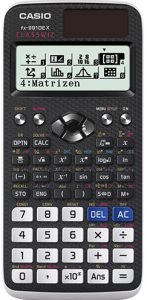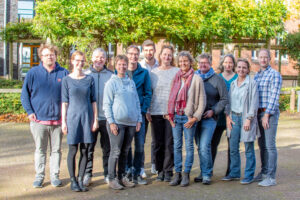Maths
Mathematics is karate of the mind.
Albrecht Beutelspacher (*1950)
Head of Mathematics: Stefan Karkow (Ka)
Mathematics is way more than just calculating. It is about recognizing (or creating) patterns and structures, which have to be evaluated in order to then be used for conclusions.
Due to the fact that the “real life” consists of patters and structures, Mathematics is applicable in many ways.
Alongside calculating there are also other mathematic activities: Drawing or sketching, investigating, deciphering, discovering, guessing, verifying, proving, simplifying, modelling and interpreting.
A big part of the maths classes deals with understanding of abstract subjects as abstracting is only possible when laying the groundwork through specific experiences before. If you are advanced into a term of a mathematic perception, you have to discover and distinguish the important from the unimportant.
Mathematic tools are helpful for that: Compass, ruler, goniometer, triangle ruler, calculator, formulary, function-plotter, …
Like any other science, mathematics has its own terminology. Its vocabulary and grammatical constructions must be learned in order to understand mathematic texts. Naturally this terminology is taught in the maths classes.
In the lower and middle grades, new number ranges (fraction numbers, integral numbers, rational numbers, real numbers) are introduced and the basics of geometry, algebra, calculus and stochastics are taught.
In the senior grades, the students have to prepare for the topics of calculus, analytic geometry and stochastics. These topics are going to be important for the “Abiturprüfung”, the school leaving examination, but also for future studies and professions.

Starting in the 7th grade at the AVS, the calculator Casio FX 991 DE X is used until the “Abiturprüfung”. In this examination it is only allowed to use the calculator for two-thirds of the tasks. For these tasks the students should know every feature of the calculator.
The maths teachers at the AVS continue their intern and extern education about the Casio FX 991 DE X. Exams usually consist of tasks in which you are allowed to use the calculator and tasks in which you are not.
Media use:
The regular usage of spreadsheet programmes (e.g. Excel, Calc) and the DSG-software Geogebra is designated in the method catalogue of the subject curriculum.
The AVS is competing in the following mathematical competitions:
- Mathematikolympiade (mathematical olympics)
-
Lange Nacht der Mathematik (long night of mathematics)
-
Känguru-Wettbewerb (kangaroo competition)
| Teacher | Second subject |
|---|---|
| Mrs Alpers | French |
| Mrs Bustorf | Physics |
| Mr Erhardt | History, Information science |
| Mr Felgendreher | Physical Education |
| Mr Karkow | Physics |
| Mrs Kriech | Chemistry |
| Mr Kruse | Information science, Physics |
| Mr Lindström | |
| Mrs Löbel | Protestant Religion |
| Mrs Sörensen | Physics, Information science |
| Mrs Timmermann | Evangelic religion, Theatre, Information science |
| Mr Vollmert | Physics |
| Mr. Wulff | Physical Education |
The given links are showing some of the applets of Goegebra designed for teaching. It is suitable for personal computers, laptops and tablets. Phone displays are a little bit too small.
Analysis Q1: fundermental antiderivatives https://www.geogebra.org/m/g5JtPrP6
Analysis Q1: integral trainer linear functions https://www.geogebra.org/m/DheQS2Kz
Geometry Q1: skalar product calculations on a triangle https://www.geogebra.org/m/WtfPyUtV

